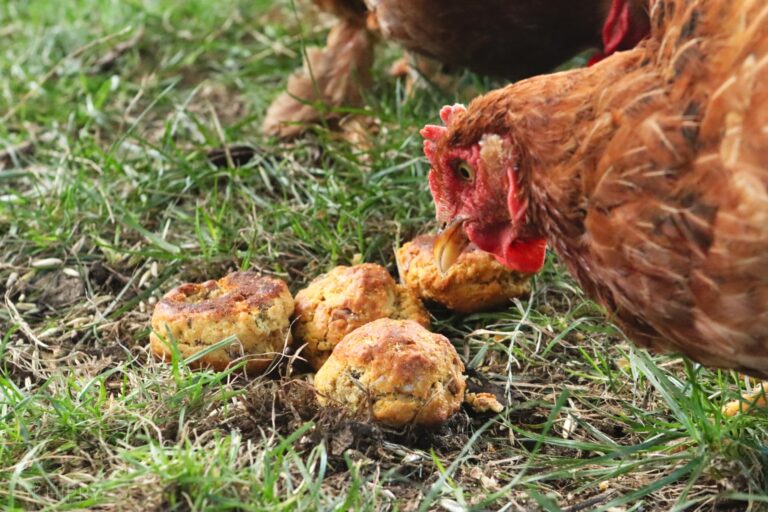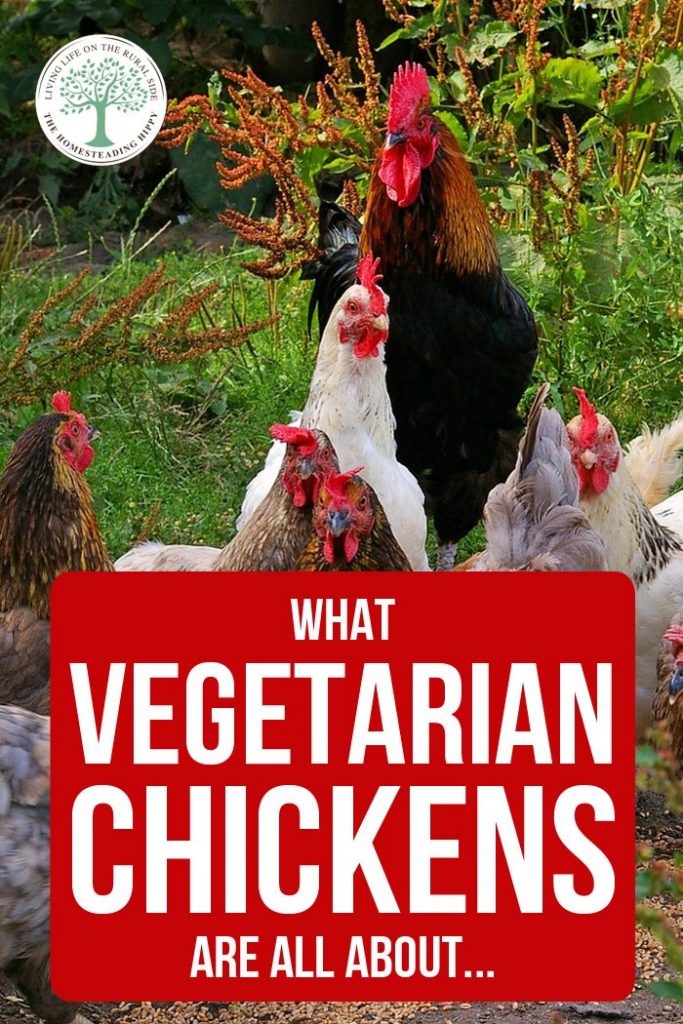Take a stroll down the egg aisle at your supermarket. Without a doubt, you will see countless types of eggs with all kinds of monikers. Some claim to be free-ranged, some are cage-free, and others are organic.

But what about vegetarian? And what does it mean if a label reads, “USDA verified 100% vegetarian-fed chicken?”
If you’re confused because you thought chickens were omnivores, don’t feel alone – the label is definitely confusing.
Eating the eggs or meat from vegetarian-fed chickens isn’t necessarily better for you, and the term is often used as an overarching marketing machine that often falls short of its promises.
Remember, chickens are designed to eat insects, plants, and animals. Chickens are natural foragers, and feeding your birds a vegetarian diet isn’t necessarily healthy.
Yet, there are some health benefits of eating eggs from vegetarian chickens – here’s what you need to know in order to make an informed decision about what to buy and what to feed your own backyard flock.
Table of Contents
What Are Vegetarian Chickens?
Vegetarian chickens were raised on feed that is free of animals, animal by-products, and waste from animal processing.
Even if you are only feeding your chickens grain, you are not feeding them a vegetarian diet – most commercial livestock feed contains byproducts of animals, like whey left over from cheese making.
Vegetarian livestock feed, on the contrary, is only made out of plant materials. It only has ingredients that don’t contain animal products of any kind.
A note of caution: so-called vegetarian hens are not organic, free-range, cage-free, or anything else like that, for that matter.
The label of “vegetarian” on a carton of eggs doesn’t mean a lot, especially if you have any understanding of how chickens actually survive.
By nature, a chicken is designed to peck, scratch, and forage for its food, so “vegetarian” is a complicated term.
To understand exactly what a vegetarian chicken is, it is important to get into the details of a vegetarian diet. When it comes to commercially raised chickens, this can mean one of two things.
The first is that the vegetarian-fed hens were restricted from their natural diet. They were not allowed to forage on grubs, bugs, and other foods they would naturally find on pasture. In order to do this, a vegetarian hen in this context would not be allowed to free-range at all.
The second – and perhaps more acceptable – form of vegetarianism in chickens is when a chicken is fed commercial feed that does not contain any kind of animal byproducts.
Animal byproduct is a vague term that you might see in a label. It can include anything from blood, bone meal, feathers, same-species or other-species meat, roadkill, and even euthanized pets like dogs and cats.
The proteins in the vegetarian feed, on the contrary, are derived from another source besides animal meal or byproduct. Vegetarian feed is healthy for your chickens in this sense, but they should not be restricted from pasture – there are so many benefits to allowing chickens to free-range!
Technically, a carton of eggs that are labeled as vegetarian should mean only that the chicken was fed a diet free of animal byproducts.
There’s nothing wrong with that – but the problem arises when you realize that a chicken in its natural environment is not going to be vegetarian, and that producers must restrict chickens from that environment in order to maintain the legitimacy of the vegetarian marketing scheme.
What Are the Benefits of Vegetarian-Fed Chickens?
While it should go without saying that vegetarians aren’t going to eat chickens, no matter how they were raised, there are some benefits of eating the meat and eggs produced by vegetarian-fed chickens.
For starters, the eggs and meat from vegetarian birds do have a more distinctive flavor. It’s not that it’s good or bad, or more or less nutritious. Simply put, the meat is just different.
There aren’t many benefits involved with eating vegetarian-fed chickens. Some people argue that chickens who are not fed animal by-products are less likely to engage in cannibalism behaviors.
While it is true that feeding your chickens whole eggs in the shell or even the flesh from a chicken can lead to them developing a “taste” for the foods, animal byproduct is not likely to do so.
Even if you choose to purchase a vegetarian feed without any animal byproducts, it’s important that you continue to supplement your chickens’ diets with ample protein.
They should still be allowed to free-range and graze for bugs, snakes, mice, and other tasty morsels. Without ample protein – adequate quantities of which cannot be obtained through corn, soybeans, or other foods alone – your chickens cannot survive.
What Are the Disadvantages of Vegetarian-fed Chicken?
One of the biggest drawbacks of raising vegetarian hens is that chickens are omnivores and require full protein. Whether they’re getting this through insects or though a commercial feed, they need to have a diet high in protein in order to survive – and to lay healthy eggs.
Also, if a chicken is fed a vegetarian diet, there’s a good chance that it is kept inside its entire life. After all, a chicken does not have a natural inclination to be a vegetarian.
It is going to nibble on insects and other sources of protein occasionally – meaning it cannot be marketed as vegetarian unless it was kept under strictly monitored conditions.
Another disadvantage of vegetarian hens is that these chickens often fall short of essential amino acids. One to pay attention to is methionine, a protein-based amino acid for animals like chickens, horses, and even humans.
To make up for this deficiency, farmers raising vegetarian hens are forced to feed their chickens this amino acid in the synthetic form – which is not organic.
To counter this, the USDA has said that vegetarian hens can be fed synthetic methionine and still be considered organic – but only in small amounts.
Organic chickens are then fed with a mixture of corn, soybeans, and a small supplement of synthetic methionine. This has, in turn, angered many farmers who claim that their chickens are underfed.
And for farmers who choose not to feed synthetic methionine, the results are even worse. Chickens will peck at each other in search of nutrients, leading to deaths and excessive violence in the chicken coop.
Chickens have diverse palates, and when their nutritional needs are not being met by the food they are being given by the farmer, they will do whatever they can to make up for them.
If you choose to feed your chickens a vegetarian diet, I recommend that you do this only by purchasing feed without animal byproducts.
I don’t recommend putting your flock on an entirely plant-based diet. They need protein, and it can be tough to get this from feed alone.
Plus, by restricting your chickens’ access to pasture, you will be depriving them of many other benefits, like the ability to take in fresh air, limit exposure to manure, and nibble on fresh grasses.
Therefore, if you choose to adopt a vegetarian diet, consider only doing so with the feed. Look for a vegetarian chicken feed but still allow for access to pasture. And don’t forget to supplement your birds’ diets with treats like mealworms!
Should Vegetarians Eat Vegetarian Hens or Eggs?
If you saw labels for “vegetarian hens” at the supermarket and were confused, you aren’t alone. The marketing can be confusing!
However, at the end of the day, chicken is chicken – no matter what it was fed. It is still an animal, and eating a vegetarian-fed chicken is still eating meat.
That being said, some vegetarians object to eating eggs from chickens who ate meat. They prefer, instead, to eat eggs from vegetarian chickens.
Should I Feed My Hens a Vegetarian Diet?
Unless you have pretty solid reasons for doing otherwise, no – you should not feed your chickens a diet solely comprised of vegetarian feed. Like many other creatures, chickens are omnivores.
They need to eat foods like mice, lizards, insects, and snakes. These foods are healthy for your chickens to consume and part of a natural diet.
The exception to this is when you are purchasing commercial feed. In some cases, it may make sense to buy vegetarian feed.
It can omit proteins that you might not be interested in offering your flock, like animal byproducts. However, if you do this, you will need to supplement with proteins from another area.
Another option is to buy your feed from a local producer who can clearly tell you what is put into the mixture. You can often choose what ingredients go into the feed, and even better – you can see the facility yourself.
Raising chickens yourself, or selecting and purchasing eggs from a friend or local farmer who raises their chickens in an ethical way, is easily the best way to make sure the food you eat is good for you – and good for the birds.
Look for a feed that does not contain any animal by-products but instead, look to natural sources of protein for your flock. They’ll be happy, and you’ll be healthier for it, too.


Rebekah is a full-time homesteader. On her 22 acres, she raises chickens, sheep, and bees, not to mention she grows a wide variety of veggies. She has a huge greenhouse and does lots of DIY projects with her husband in her ever-growing homesteading endeavor. Learn more about Rebekah here.

I’m vegetarian. When I kept chickens they ate everything that was too slow to escape. It’s their natural diet. I happily ate their eggs too
I fall into that ‘unless you really have a good reason’ category. We have 12 birds, and I’m allergic to any mammal fats or whey or vit D additives.
I have to wear ventilator with external air to enter the henhouse. Its bad.
Looking for sources to buy food, and there’s no suggestions.